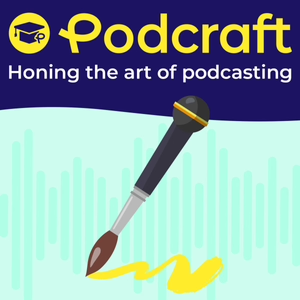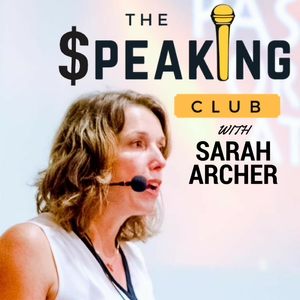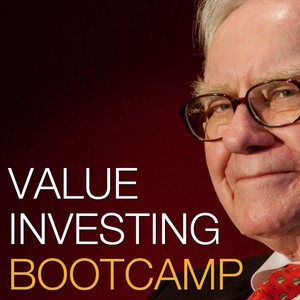
Ep202: What Kind of Person is Your Corporation? – The Case for Equity Diversity & Inclusion – Ali Interviews Rosie
05/26/21 • 34 min
What do you think is the business case for equity, diversity and inclusion? In business, or even not for profit, should morality or humanitarian reasons play a role? Or should it strictly be about profit and shareholder value?
I have some opinions on this, which I apply in my work as an Equity, Diversity and Inclusion Strategist. But as a podcaster, I've tried to keep the focus on my guests' perspectives, until one of my guests asked to switch places with me. Ali Ahmed, whom you heard in the previous episode, wanted to hear my experiences as a recruiter, HR director and not-for-profit executive.
So in this episode, Ali will host me. And I give some pretty blunt opinions about many business systems that we've taken for granted, which are structurally set up to discriminate and exclude. And it's not because they're racist or misogynist or anything related specifically to people. The sad thing is, systemic discrimination is also rooted in capitalism. If you're wondering how that happens, tune in to this episode. We'll explain how this plays out in recruiting, succession planning, even charity and corporate social responsibility.
Contact Rosie and find JEDI resources at: https://www.changinglenses.ca/
In this episode, we talk about:
[03:06] A story explaining inclusivity and diversity.
[09:00] The need to decolonize and de-patronize philanthropy.
[14:29] That the donors who hold money, hold power.
[18:06] Diversity at the C-suite and Board levels.
[21:03] Discrimination in recruiting immigrants and racialized people.
[27:11] How do we make recruitment more equitable?
[33:50] A corporation is a person. What kind of person is it?
[38:47] Focus on positive change in the future, not mistakes of the past.
Full transcript available here.
Guest Bio and References/Links
About Rosie Yeung:
Rosie is a Speaker, Coach, Strategist, and Podcaster for Justice, Equity, Diversity, and Inclusion (JEDI), specializing in intersectional diversity and Asian-Canadian identity. Her life goal is to reduce social inequity and discrimination, especially in wealth, race, and gender. Rosie loves mentoring Asian and racialized women to succeed in business as their true selves.
As a Chinese-Canadian, immigrant, cis-straight female with invisible disabilities, Rosie’s intersectional identities help her empathize with diverse communities and bring compassion and kindness to her work. With over 20 years of professional and lived experiences, she holds certificates in inclusion, consulting, Indigenous history, human rights, and more.
Based in Toronto, Canada, Rosie enjoys travel (except during global pandemics) and has served communities in Guatemala, Ghana, Nigeria, Rwanda, and Uganda. To de-stress, she watches movies and eats popcorn and ice cream – sometimes simultaneously!
Find Rosie on:
Instagram: https://www.instagram.com/rosieyeung_jedi/
LinkedIn: https://www.linkedin.com/in/rosieyeung/
Facebook: https://www.facebook.com/changinglensesca
References and resources in this episode:
Book “Decolonizing Wealth” referenced in the episode: https://www.edgarvillanueva.net/the-book-1
What do you think is the business case for equity, diversity and inclusion? In business, or even not for profit, should morality or humanitarian reasons play a role? Or should it strictly be about profit and shareholder value?
I have some opinions on this, which I apply in my work as an Equity, Diversity and Inclusion Strategist. But as a podcaster, I've tried to keep the focus on my guests' perspectives, until one of my guests asked to switch places with me. Ali Ahmed, whom you heard in the previous episode, wanted to hear my experiences as a recruiter, HR director and not-for-profit executive.
So in this episode, Ali will host me. And I give some pretty blunt opinions about many business systems that we've taken for granted, which are structurally set up to discriminate and exclude. And it's not because they're racist or misogynist or anything related specifically to people. The sad thing is, systemic discrimination is also rooted in capitalism. If you're wondering how that happens, tune in to this episode. We'll explain how this plays out in recruiting, succession planning, even charity and corporate social responsibility.
Contact Rosie and find JEDI resources at: https://www.changinglenses.ca/
In this episode, we talk about:
[03:06] A story explaining inclusivity and diversity.
[09:00] The need to decolonize and de-patronize philanthropy.
[14:29] That the donors who hold money, hold power.
[18:06] Diversity at the C-suite and Board levels.
[21:03] Discrimination in recruiting immigrants and racialized people.
[27:11] How do we make recruitment more equitable?
[33:50] A corporation is a person. What kind of person is it?
[38:47] Focus on positive change in the future, not mistakes of the past.
Full transcript available here.
Guest Bio and References/Links
About Rosie Yeung:
Rosie is a Speaker, Coach, Strategist, and Podcaster for Justice, Equity, Diversity, and Inclusion (JEDI), specializing in intersectional diversity and Asian-Canadian identity. Her life goal is to reduce social inequity and discrimination, especially in wealth, race, and gender. Rosie loves mentoring Asian and racialized women to succeed in business as their true selves.
As a Chinese-Canadian, immigrant, cis-straight female with invisible disabilities, Rosie’s intersectional identities help her empathize with diverse communities and bring compassion and kindness to her work. With over 20 years of professional and lived experiences, she holds certificates in inclusion, consulting, Indigenous history, human rights, and more.
Based in Toronto, Canada, Rosie enjoys travel (except during global pandemics) and has served communities in Guatemala, Ghana, Nigeria, Rwanda, and Uganda. To de-stress, she watches movies and eats popcorn and ice cream – sometimes simultaneously!
Find Rosie on:
Instagram: https://www.instagram.com/rosieyeung_jedi/
LinkedIn: https://www.linkedin.com/in/rosieyeung/
Facebook: https://www.facebook.com/changinglensesca
References and resources in this episode:
Book “Decolonizing Wealth” referenced in the episode: https://www.edgarvillanueva.net/the-book-1
Previous Episode

Ep201: Immigrants Need Not Apply, with Ali Ahmed
Ali Ahmed is a professional designated accountant who worked for one of the Big Four international accounting firms before immigrating from Pakistan to Canada. But despite having that professional experience, he couldn't get an accounting job in Canada until he got some "Canadian experience" under his belt.
As a former recruiter myself, I can verify that the prejudices Ali describes are real. I’m really glad that he's willing to share with you the unnecessary obstacles he faced in a country that supposedly welcomes immigrants and diverse ethnicities. After all, it's one thing to let people in the front door. It's another thing to let them sit at the same table with us.
So as you listen to Ali's story, I challenge you to think about what you deem essential job requirements and whether they're really that essential. And if your first thought is “they're all essential,” – think again.
Contact Rosie and find JEDI resources at: https://www.changinglenses.ca/
In this episode, we talk about:
[04:41] Immigrating to Canada (and challenges for his Pakistani family after 9/11).
[08:34] First impressions of Canada.
[09:33] Looking for work as an immigrant without “Canadian experience”.
[20:16] When Ali felt included at work.
[21:44] When Ali felt excluded at work.
[24:41] Having identities / labels put on him, instead of choosing his own.
[26:16] Ali’s advice for new immigrants and people looking for work.
Full transcript available here.
Guest Bio and References/Links
About Ali Ahmed:
Ali Ahmed is a forward-looking finance leader who works with organizations to help achieve their potential by making financially informed decisions. He provides strategic direction, develops budgets, and provides useful critical financial information. Ali’s superpower is to present complex financial information simply and concisely.
He is currently the Manager, Strategic Financial Management at Canadian Blood Services.
You can contact Ali via LinkedIn: https://www.linkedin.com/in/ali-ahmed-cpa/
References and resources in this episode:
Woodgreen Community Services: https://www.woodgreen.org/
Canadian Blood Services: https://www.blood.ca/en
Next Episode

Ep203: Breaking the Chains of Trauma, with Miriam Njoku
Have you ever been told you can’t do it, or you’re not good enough for something you really wanted? What if you got that message in your whole life starting from childhood? What if abuse or racism you’ve endured created trauma that affects your work or relationships? How do you heal wounds that you can’t see?
Miriam Njoku knows the struggle all too well. The abuse that she endured as a child and teenager and the racism she experienced at school and at work caused trauma that would cripple ten people, let alone one. Yet somehow, Miriam not only survived all this, but she also found resilience and strength in herself that allowed her to succeed in the world’s eyes. What we couldn’t see was the continued damage from internal wounds that were never healed and led to her shame and even workaholism. Thankfully, Miriam found the healing she needed to be a whole and healthy mom, writer, podcaster, and African woman.
Miriam left a flourishing career in banking and international development with organizations like the United Nations so she could become a trauma-informed coach, helping people free themselves from the burdens of childhood trauma. She’s also working to destigmatize mental health in black communities through activities like her podcast, Overcoming Your Story.
If you’re looking for ways to heal from your past traumas, or if you want to support someone who needs that healing, Miriam shares ways we can do that using her own personal story.
And if you speak French, finally, I have content for you in your language. Thanks to Miriam’s bilingualism, please stick around to the end because she has a special message for you.
Content Warning: This episode contains references to childhood abuse and trauma, sexual abuse, and racism. Though not graphic, some listeners may be disturbed by the painful stories. Miriam has endured so much that we had to break it up, and she’ll talk specifically about workplace racism in the next episode.
Full transcript available here.
Contact Rosie and find JEDI resources at: changinglenses.ca/
In this episode, we talk about:
[01:17] Miriam as a Black African in Cameroon.
[03:13] Miriam as a Black African in Switzerland.
[04:39] Systemic racism in Swiss schools.
[09:42] Miriam’s traumatic childhood, and what happened to her mother.
[16:28] Her desire for education as a reaction to abuse.
[21:06] Hiding shame beneath a veneer of perfection.
[25:50] How we can help – indications of possible trauma in others.
[28:24] Trauma’s impact on motherhood.
[30:49] Encouraging trauma victims to ask for help.
[33:43] A message of support in French.
Guest Bio and References/Links
Miriam is a Trauma Informed Coach, an African, a mom of three daughters, a blogger and writer. After graduating from the London School of Economics, she built her international career in the fields of banking and international development, working for organizations such as the World Economic Forum, Lombard Odier Private Bank, JP Morgan, the Mastercard Foundation and the United Nations. She now uses her passion for psychology and dedicates her time to coaching others to free themselves from the burden of childhood trauma through sharing the knowledge she acquired on her own healing journey and storytelling. Her wish is to destigmatize mental health and normalize conversations on mental health in black communities.
Find Miriam on:
Website: https://www.miriamnjoku.com/
IG:
Changing Lenses: Diversify Your Perspectives - Ep202: What Kind of Person is Your Corporation? – The Case for Equity Diversity & Inclusion – Ali Interviews Rosie
Transcript
Episode Transcript
Please note: the transcripts attempt to stay true to the essence of each conversation, while maintaining clarity and readability. As a result, certain "filler" words, and nuances of tone, emotion and emphasis will be missing.
If you're able, you're strongly encouraged to listen to the audio podcast. Transcripts are generated using a combination of speech recognition software and human editors, and may contain errors.
Ep12: What Kind of
If you like this episode you’ll love
Episode Comments
Generate a badge
Get a badge for your website that links back to this episode
<a href="https://goodpods.com/podcasts/changing-lenses-diversify-your-perspectives-189593/ep202-what-kind-of-person-is-your-corporation-the-case-for-equity-dive-17473050"> <img src="https://storage.googleapis.com/goodpods-images-bucket/badges/generic-badge-1.svg" alt="listen to ep202: what kind of person is your corporation? – the case for equity diversity & inclusion – ali interviews rosie on goodpods" style="width: 225px" /> </a>
Copy




